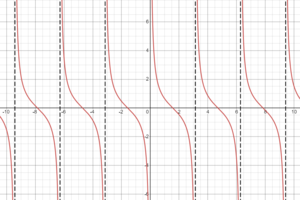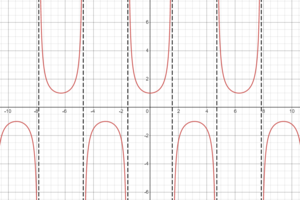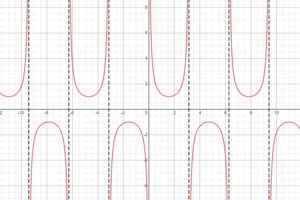Difference between revisions of "Graphs of the Tangent, Cotangent, Cosecant and Secant Functions"
| (13 intermediate revisions by the same user not shown) | |||
| Line 1: | Line 1: | ||
| − | == | + | === Tangent === |
| + | [[File:Graph of tangent.png|thumb|Graph of tangent]] | ||
| + | |||
| + | The '''tangent''' of an angle is equivalent to the sine of that angle divided by the cosine of that angle. | ||
| + | |||
| + | <math>\tan x = \frac{\sin{x}}{\cos{x}}</math> | ||
| + | |||
| + | The range of the function <math>y = \tan{x}</math> is <math>(-\infty ,\infty)</math>. Note that since <math>\tan{x} = \frac{\sin{x}}{\cos{x}}</math>, <math>y = \tan{x}</math> is not defined whenever <math>\cos{x} = 0</math>; that is, when <math> x = \pi k + \frac{\pi}{2} </math> for any integer k. We can see that there is a vertical asymptote at each of these values in the graph of <math>y = \tan{x}</math>. | ||
| + | |||
| + | |||
| + | |||
| + | |||
| + | === Cotangent === | ||
| + | [[File:Graph of cotangent.png|thumb|Graph of cotangent]] | ||
| + | |||
| + | The '''cotangent''' of an angle is the reciprocal of its tangent. | ||
| + | |||
| + | <math>\cot x = \frac{1}{\tan x}</math> | ||
| + | |||
| + | The range of the function <math>y = \cot{x}</math> is <math>(-\infty ,\infty)</math>, the same as the range of its reciprocal <math>\tan{x}</math>. <math>\cot{x} = \frac{1}{\tan{x}} = \frac{\cos{x}}{\sin{x}}</math>, so <math>y = \cot{x}</math> is not defined whenever <math>\sin{x} = 0</math>; that is, when <math> x = \pi k </math> for any integer k. We can see that there is a vertical asymptote at each of these values in the graph of <math>y = \cot{x}</math>. | ||
| + | |||
| + | |||
| + | |||
=== Secant === | === Secant === | ||
| Line 8: | Line 30: | ||
<math>\sec x = \frac{1}{\cos x}</math> | <math>\sec x = \frac{1}{\cos x}</math> | ||
| − | The range of <math> \cos{x} </math> is <math> [-1, 1] </math>, so the range of <math> \sec{x} </math> is <math> (-\infty , -1] \cup [1, \infty ) </math>, which is all possible outputs of 1/x for <math> -1\leq x\leq 1 </math>. Since <math> \frac{1}{0} </math> is not defined, <math>\sec{x}</math> is not defined whenever <math>\cos{x} = 0</math>; that is, when <math> x = \pi k + \frac{\pi}{2} </math> for any integer k. We can see that there is a vertical asymptote at each of these values in the graph of <math>y = \sec{x}</math>. | + | Like <math> y=\cos{x} </math>, <math> y = \sec{x} </math> is an even function; that is, <math> \sec{(x)} = \sec{(-x)}</math>. The range of the function <math> y = \cos{x} </math> is <math> [-1, 1] </math>, so the range of <math> \sec{x} </math> is <math> (-\infty , -1] \cup [1, \infty ) </math>, which is all possible outputs of 1/x for <math> -1\leq x\leq 1 </math>. Since <math> \frac{1}{0} </math> is not defined, <math>y = \sec{x}</math> is not defined whenever <math>\cos{x} = 0</math>; that is, when <math> x = \pi k + \frac{\pi}{2} </math> for any integer k. We can see that there is a vertical asymptote at each of these values in the graph of <math>y = \sec{x}</math>. |
| + | |||
| + | |||
=== Cosecant === | === Cosecant === | ||
| + | [[File:Graph of cosecant.png|thumb|Graph of cosecant]] | ||
The '''cosecant''' of an angle is the reciprocal of its sine. | The '''cosecant''' of an angle is the reciprocal of its sine. | ||
| Line 16: | Line 41: | ||
<math>\csc{x} = \frac{1}{\sin{x}}</math> | <math>\csc{x} = \frac{1}{\sin{x}}</math> | ||
| − | The range of <math>\csc{x}</math> is the same as the range for <math>\sec{x}</math> (<math> (-\infty , -1] \cup [1, \infty ) </math>). <math>\csc{x}</math> is not defined whenever <math>\sin{x} = 0</math>; that is, when <math> x = \pi k </math> for any integer k. We can see that there is a vertical asymptote at each of these values in the graph of <math>y = \csc{x}</math>. | + | Like <math> y=\sin{x} </math>, <math> y = \csc{x} </math> is an odd function; that is, <math> \csc{(x)} = -\csc{(-x)} </math>. The range of the function <math> y = \csc{x}</math> is the same as the range for <math>\sec{x}</math> (<math> (-\infty , -1] \cup [1, \infty ) </math>). <math> y = \csc{x}</math> is not defined whenever <math>\sin{x} = 0</math>; that is, when <math> x = \pi k </math> for any integer k. We can see that there is a vertical asymptote at each of these values in the graph of <math>y = \csc{x}</math>. |
| − | |||
| − | |||
| − | |||
| − | |||
| + | ==Resources== | ||
| + | * [https://mathresearch.utsa.edu/wikiFiles/MAT1093/Graphs%20of%20the%20Tangent,%20Cotangent,%20Cosecant%20and%20Secant%20Functions/Esparza%201093%20Notes%202.5.pdf Graphs of the Tangent, Cotangent, Cosecant and Secant Functions]. Written notes created by Professor Esparza, UTSA. | ||
| + | * [https://en.wikibooks.org/wiki/A-level_Mathematics/CIE/Pure_Mathematics_2/Trigonometry Trigonometry], WikiBooks: Pure Mathematics 2 | ||
| − | == | + | ==Licensing== |
| − | * [https:// | + | Content obtained and/or adapted from: |
| + | * [https://en.wikibooks.org/wiki/A-level_Mathematics/CIE/Pure_Mathematics_2/Trigonometry Trigonometry, WikiBooks: Pure Mathematics 2] under a CC BY-SA license | ||
Latest revision as of 14:14, 26 October 2021
Tangent
The tangent of an angle is equivalent to the sine of that angle divided by the cosine of that angle.
The range of the function is . Note that since , is not defined whenever ; that is, when for any integer k. We can see that there is a vertical asymptote at each of these values in the graph of .
Cotangent
The cotangent of an angle is the reciprocal of its tangent.
The range of the function is , the same as the range of its reciprocal . , so is not defined whenever ; that is, when for any integer k. We can see that there is a vertical asymptote at each of these values in the graph of .
Secant
The secant of an angle is the reciprocal of its cosine.
Like , is an even function; that is, . The range of the function is , so the range of is , which is all possible outputs of 1/x for . Since is not defined, is not defined whenever ; that is, when for any integer k. We can see that there is a vertical asymptote at each of these values in the graph of .
Cosecant
The cosecant of an angle is the reciprocal of its sine.
Like , is an odd function; that is, . The range of the function is the same as the range for (). is not defined whenever ; that is, when for any integer k. We can see that there is a vertical asymptote at each of these values in the graph of .
Resources
- Graphs of the Tangent, Cotangent, Cosecant and Secant Functions. Written notes created by Professor Esparza, UTSA.
- Trigonometry, WikiBooks: Pure Mathematics 2
Licensing
Content obtained and/or adapted from:
- Trigonometry, WikiBooks: Pure Mathematics 2 under a CC BY-SA license



















![{\displaystyle [-1,1]}](https://wikimedia.org/api/rest_v1/media/math/render/svg/51e3b7f14a6f70e614728c583409a0b9a8b9de01)

![{\displaystyle (-\infty ,-1]\cup [1,\infty )}](https://wikimedia.org/api/rest_v1/media/math/render/svg/7e3448e2de68557e598967fb8b1f8900260c4a64)






